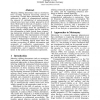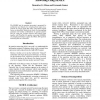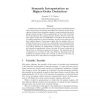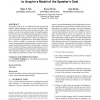120
click to vote
ACL
2009
14 years 12 months ago
2009
We consider the problem of learning context-dependent mappings from sentences to logical form. The training examples are sequences of sentences annotated with lambda-calculus mean...
112
click to vote
COLING
2002
15 years 1 months ago
2002
Meaning shifting phenomena such as metonymy have recently attracted increasing interest of researchers. Though these phenomena have been addressed by plenty of computational metho...
115
click to vote
ANLP
1992
15 years 3 months ago
1992
This paper briefly describes the current implementation status of an intelligent information retrieval system, MARIE, that employs natural language processing techniques. Descript...
FLAIRS
2006
15 years 3 months ago
2006
The SEMEX tool for question answering is presented. Its architecture and features for extracting from input text a network of concept nodes that index syntax-based logical forms, ...
145
click to vote
ACL
2007
15 years 3 months ago
2007
This paper presents the first empirical results to our knowledge on learning synchronous grammars that generate logical forms. Using statistical machine translation techniques, a...
122
click to vote
JELIA
1990
Springer
15 years 6 months ago
1990
Springer
Traditional accounts of the semantic interpretation of quantified phrases and its interaction with reference and ellipsis have relied on formal manipulations of logical forms (qua...
133
click to vote
INAP
2001
Springer
15 years 6 months ago
2001
Springer
Abstract. In requirements engineering use cases are employed to describe the ow of events and the occurrence of states in a future information system. Use cases consist of a set of...
132
click to vote
KCAP
2005
ACM
15 years 7 months ago
2005
ACM
An ultimate goal of AI is to build end-to-end systems that interpret natural language, reason over the resulting logical forms, and perform actions based on that reasoning. This r...
110
click to vote
JSAI
2007
Springer
15 years 8 months ago
2007
Springer
This paper reports our ongoing research effort to develop a system which translates legal texts into logical forms in which we can check for inconsistency. Our logical formalizati...




